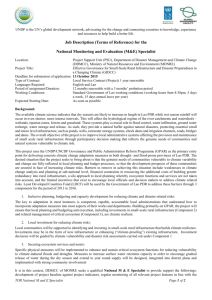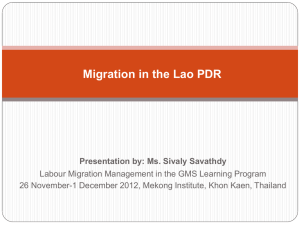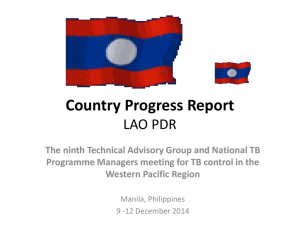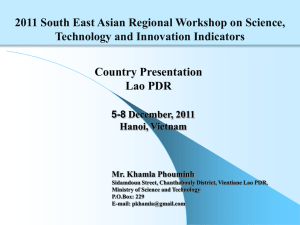Skills Standards Formation on Construction Sector
advertisement
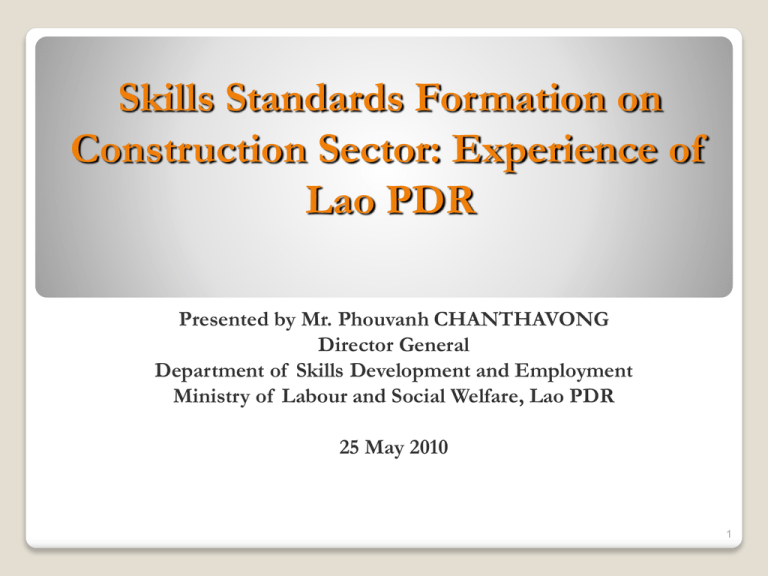
Skills Standards Formation on Construction Sector: Experience of Lao PDR Presented by Mr. Phouvanh CHANTHAVONG Director General Department of Skills Development and Employment Ministry of Labour and Social Welfare, Lao PDR 25 May 2010 1 CONTENTS I. Legal Instruments II. Education and Vocational System in Laos III. Skills Standard Development 1. Targets of Skills Development 2. Levels of Skills Standard Development 3. Type of skills Standard Development 4. Background 5. About the Project 6. Objectives of the Project 7. Priority of Skill Trades for National Skills Standard Formation in Construction Industry IV. Procedure of Formation on Skill Standard in Construction Industry in Lao PDR 2 I. Legal Instruments Referring to Decree on Skills Formation and Development No.036/PM dated 22 January 2010 stipulated functions and responsibilities between Ministry of Education and Ministry of Labour and Social Welfare as following: Ministry of Education Article 19: Responsible Organization of Vocational and Vocational EducationTraining (TVET) Ministry of Labour and Social Welfare Article 36: Responsible Organization of National Skills Standard Development and Skills Testing Certification 3 II. Education and Vocational System in Laos University 1 Gind Plimary 1 2 3 4 5 Lower Second 12 3 4 Upper Second Higher Vocational 1 Entrance Examination 2 3 =Short term Vocational 1 Vocational Training 12 13 1 2 3 2 3 14 15 16 17 2 Higher Vocational 1 =Vocational Education Sys 11 5 Higher Technician 1 =Entrance Exam 9 10 4 Intermidiate Technician =Long Term Vocational 6 7 8 3 Higher Education 1 4 5 6 2 18 2 3 19 20 III. Skills Standard Development 1. Targets of Skills Development Develop skills in accordance with socio-economic structure and regional development for balancing labourforce between urban and rural areas, and regional integration; • Focus on making Lao workers acquiring knowledge, skills, attitude by upgrading training an skills testing and certification to whom basic vocational knowledge, working workers get higher level skills and skills experienced on practice, and others disadvantage persons; • Develop skills in accordance with three types of skill standards in order to develop Lao labor skills moving closer to ASEAN and International skills standard; • 5 2. Levels of Skills Standard Development • Level 1: Semi-Skilled Worker; • Level 2: Skilled Worker; • Level 3: Tradesman; • Level 4: Supervisor; 6 3. Types of Skills Standard Development • National Skills Standard; • Local/Labor Unit Skills Standard; • Occupational Associations/Groups Skills Standard; 7 4. • • • • • Background Lao construction industries sector is one important activity in the process of socio-economic development in Lao PDR and it is in an urgent demand in current market economy development involving regional integration under rapidly changing information technology; Increased competition among business also leads to an increased demand in a skilled labourforce; Domestic and foreign investment projects particularly those in infrastructure development such as roads, hydropower and housing have been steadily increasing every year; Skills development of the employers in conducted very independently, so the resulting trained work force find it not match with the regional skills development; Trained skills are not sufficiently consistent with market need; there are no skills standard specifications for each employment type making the Lao labour quality unacceptable by employers. Therefore there are large wage gaps between Lao and foreign workers. 8 5. ABOUT the project Project on Lao national skill standard in construction industry sector is supported by ILO/Korea Partnership Programme since 2009-2011 Implementing agency: The Department of Skills Development and Employment ( DSDE), The Ministry of Labour and Social Welfare, Lao PDR 9 6. Objectives of the Project Development objective: The project will contribute to the development of the Lao national skill standards and skill certification and testing system which will be institutionalized; Immediate objective: By the end of the project a skill standards and testing and certification system for the construction sector will have been developed. 10 7. Priority of Skill Trades for National Skills Standard Formation in Construction Industry With Cooperation of ILO that organized the workshop on National Skills Standard, which was held on December 2007 in Vangvieng district , Vientiane province. The construction industry was selected and defined as priority to be developed as skills standard for 10 skill trades as following: 1. 2. 3. 4. 5. 6. 7. 8. 9. 10. Reinforced concrete Plastering and Brick laying Cast Plaster and Faced Cornice Plumbing Welding Electric installation Wood furniture Floor and wall tiling Aluminum Painting 11 V. Procedure of Formation on Skill Standard in Construction Industry in Lao PDR Appointed construction skill standard committee by Labour Minister Sent four members of the committee to be trained in Korea Draft format of reinforced concrete finalized in both Lao and English version Reported the output to Labour Minister Meeting of approval format by stakeholders Conduct pilot testing module in three skill standard Set up technical taskforce for working with Korean experts Summary meeting with construction skill standard Feedback of pilot testing by stakeholders Interviewed stakeholders for collecting information Developed the reinforced concrete skill standard (steel bar, concrete & form work) Validate the skill standard Analyzed and reported the output of data collection Consultative meeting with construction skill standard committee Enforcement of reinforced concrete and finalised 10 priorities skills standard 12 Thank you for your attention 13





